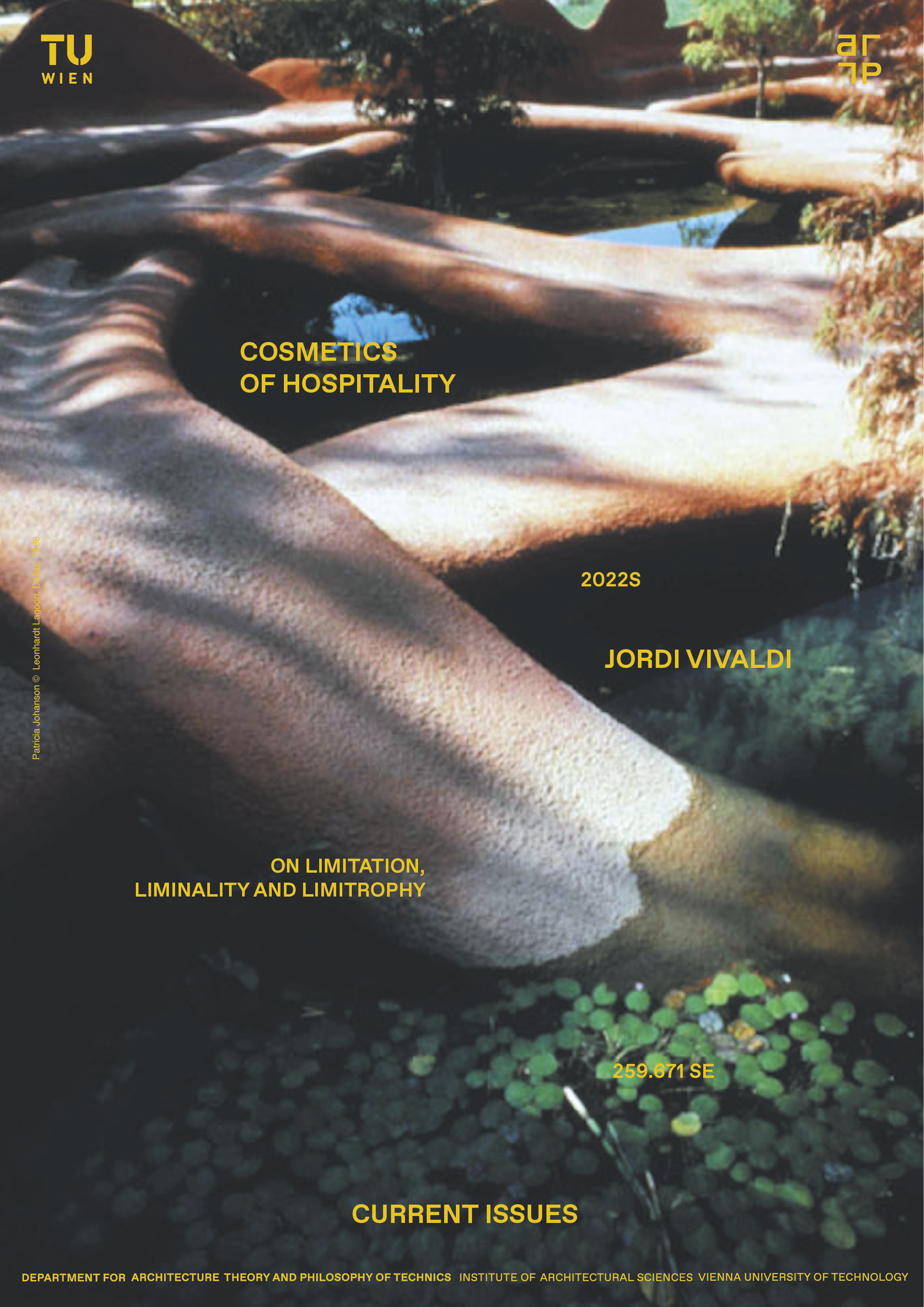
Nach positiver Absolvierung der Lehrveranstaltung sind Studierende in der Lage...
(In terms of Content)
- Gain knowledge regarding the particular themes of the course,
- Understand and articulate the various contexts that will be discussed in class,
(In terms of Arguments)
- Develop a research topic which is connected to the contents of the course, while being explored and expressed in an academic manner,
(In terms of Method)
- Read across various disciplines, engage abstractly with texts and collectively discuss them,
- Differentiate between academic and journalistic sources and forms of writing,
- Cultivate methodological skills to write in a manner adequate to academic research
(principles of library and internet research, correct handling of quotation and bibliography, primary forms of argumentation).
Cosmetics of Hospitality: the Limited, the Liminal and the Limitrophe
Hospitality; a form of pact, a contract, a play of hide and seek. Care and generosity towards the figure of the unknown, the foreign, the xenos, but also a political commitment, a form of openness to and by an-other involving as well the community, the generation, the genealogy. A collective -if not cosmological- endeavor that today, in light of the Anthropocene’s miscegenations, demands to trespass the human circumscription characteristic of the Greek xenia in order to conceive hospitality as a commitment of human and non-human affiliation: What does it mean to be hospitable on a planet shared with zoe/geo/techno modes of inhabitation? How to let them come, to let them arrive? How can they take their place in our place? In brief, how to give them, to give ourselves, spaces of inhabitation that are hospitable enough to live together well?
Architecture, philosophy, mythology, art and science will nurture this seminar’s fascination with these questions by offering us tools to ramify and recreate the notion of limit. If inhabitation implies the production of spaces within spaces, the presence of limits holding flesh together-in-their-difference seems pivotal. The differential sameness and autoreferential difference of those limits will be connected to hospitality by expanding their usual architectural role of enclosure in order to foliate into three codifications: the limit-contour (Where does something end?); the limit-action (How far does the power of something go?), and the limit-milieu (What territories might be opened within the limit itself?). The numerous turns, overlaps, collisions, angles, jumps and intertwinings operating between these codes of limitation, liminality and limitrophy will orchestrate the cosmetics of hospitality proposed in this Seminar: articulations of spatial techniques (techne) seeking to collect everything that can be considered (cosmos) while producing new variations and unknown resonances regarding pleasurable forms of cohabitation.
- Readings
Stacy Alaimo, Exposed: Environmental Politics and Pleasures in Posthuman Times. Minneapolis: University of Minnesota Press, 2013.
[With special attention to Part 1 “Posthuman Pleasures”]
Gilles Deleuze, On Spinoza, Transcription of his lectures in Vincennes from 2.12.1980 to 24.3.1981.
[With special attention to the session on 17.02.1981]
Vinciane Despret, “The Body We Care For: Figures for
Anthropo-zoo-genesis”, Body and Society, no. 10.3, 2014.
[With special attention to the section “New Distributions: Lorenz and the
Becoming Jackdaw’]
Rick Dolphijn, The Philosophy of Matter, London: Bloomsbury Academic, 2021.
[With special attention to Part 2 “This is not the Earth!”]
Joseph Rykwert, The Idea of a Town: The Anthropology of Urban Form in
Rome, Italy and the Ancient World, London, Faber and Faber, 2011. [With special attention to Chapter 3 “Guardians of Centre, Guardians of
Boundaries”]
Emanuele Coccia, Filosofia della Casa: Lo spazio domestico e la felicità. Milano, Giulio Einaudi Editore, 2021.
[With special attention to the chapters “Introduzione. La casa oltre la città”, “Traslochi” and “Cucine”.]
The seminar is structured around the topic of Cosmetics of Hospitality and its relation to the notion of limit. From this base, each student will cultivate and deploy their specific line of thought, which will be accommodated through three different resources:
- In class group conversations
- Week to week writing exercises
- Two audiovisual documents developing the concept of Cosmetics of Hospitality that
should be seen outside class time.
- Optional meetings outside class time to prepare the essay of 8 - 12 pages that each
student is submitting at the end of the course.
Mondays
9:00 - 11:00
at: ATTP Seminar Room (Wiedner Hauptstr. 7, Stiege 2, Stock 1)
Start: 14.03.20022
Beachten Sie beim Verfassen der Ausarbeitung bitte die Richtlinie der TU Wien zum Umgang mit Plagiaten:
Leitfaden zum Umgang mit Plagiaten (PDF)